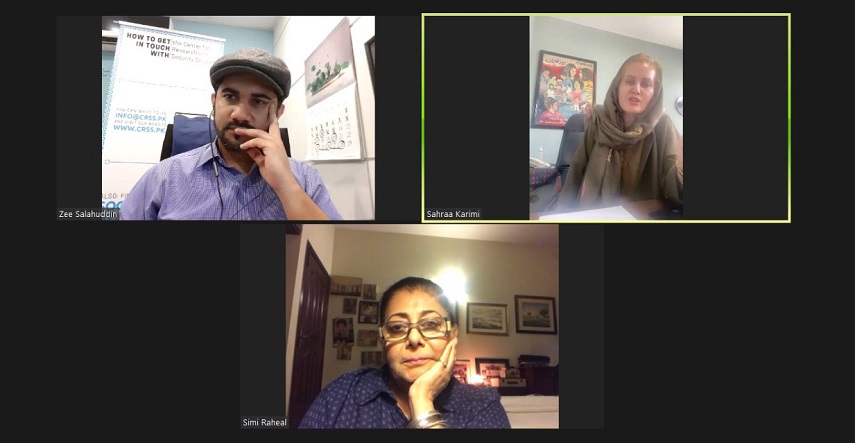As part of its efforts to bridge the gap between the people of Afghanistan and Pakistan, the Center for Research and Security Studies (CRSS) – in collaboration with its sister organization Afghan Studies Center – organized a Pak-Afghan Youth Webinar on the theme “Exploring Avenues of Cross-Collaboration in Culture and Art between Afghanistan and Pakistan” on August 20, 2020. The panelists invited were Ms. Sahraa Karimi, film director and Director General, Afghan Film, Afghanistan and Ms. Simi Raheel, a seasoned artist/actor and development professional Pakistan. The webinar was moderated by CRSS’ Program Director of the Pakistan-Afghanistan Track 1.5/II initiative Beyond Boundaries, Zeeshan Salahuddin, and attended by 37 young Afghans and Pakistanis from both countries.
In his opening remarks, Beyond Boundaries’ Project Lead, Zeeshan Salahuddin, welcomed and introduced the panelists to the attendees from both countries. Expounding on the theme in focus, he stated that in the current era, collaborations between both countries in the field of art, cultural promotions, sports, literature, and drama, are missing. To pursue working on these avenues, CRSS felt the need to engage prominent personalities with vast experience in these fields to share their insights and propose ideas on future collaborations to strengthen the people-to-people contact and portray a soft image of both countries to each other and the world.
In her keynote speech, Karimi, Afghanistan’s first female with a PhD in film, recalled that before visiting Pakistan in 2019, she held a very different perception of the country due to its negative portrayal in the media and the political unrest between Kabul and Islamabad. Unfortunately, due to the strained state-to-state relations, both countries could not get the opportunity to collaborate and cooperate in cultural or art exchanges. She expressed her excitement over the abundance of talent present in both countries and was optimistic that if the youth of both countries are provided with sufficient platforms and opportunities, they can excel greatly in these domains. She urged both governments to conduct music and film festivals in order to promote exchanges in this field between both countries.
She said young moviemakers should be encouraged to visit both countries and preferably focus on portraying the positive aspects through their short movies and documentaries. She commended CRSS on its continued efforts to highlight such avenues of cooperation and broadening the youth’s horizons towards positive messaging.
Expressing her views from Pakistan’s side on this pertinent topic, Raheal, media giant with a career spanning 43 years, applauded CRSS for choosing a constructive topic of discussion for the youth of both countries at a time of uncertain political and security situation. She stated that both countries have inherited shared ancestral history and are influenced by various cultural civilizations such as the Persians and Pashtoons, resulting in several cultural commonalities between both countries. She expressed her grief while stating that it is heartbreaking to see the war-torn image of Afghanistan propagated in the media whereas, on the contrary, the country has beautiful landscapes and talented and kind people. She stressed on the need to carry out programs and initiatives which focus on and portray the positive aspects of both countries to the world. She recommended that the youth of both countries should collaborate in projecting the true image to the world through digital platforms such as radio shows, TV programs, and social media, the domains of fashion, food, culture, music, literature, and drama.
In the Q&A session, participants raised several questions regarding 1) the contribution of students in bringing the people of both countries together, 2) the role the governments of both countries can play, and 3) whether Afghan and Pakistani dramas can be dubbed in each other’s languages, as in the case of the Turkish dramas in Pakistan, as a way to promote culture, and so on.
In response, the panelists stated that the role of youth should be to explore both countries and their culture with a fresh perspective clean from the prevalent negative narratives. Raheal stressed on the need to let go of the past and move forward with a humanist and constructive approach. She also suggested to the youth to make use of the country tours now available on digital platforms to be more acquainted with each other and recommended that they participate in making such videos.
In response to the query regarding the governments’ involvement, both panelists were of the view that the role of the government can never be neglected in bringing the people closer from both sides. However, they stressed that it is foremost the duty of conscientious citizens to reach out to counterparts on the other side and gain firsthand knowledge of their peers. Ms. Raheal, while answering the question with regards to promoting culture through dramas, agreed that dramas should indeed be dubbed in the local languages. She was optimistic that if Pakistani dramas would be dubbed in Dari and Pashto languages, they would have a massive viewership.
At the end, Mr. Zeeshan Salahuddin shared the good news with the participants that CRSS and PNCA would be offering scholarships of virtual Rubab classes to five Afghan art students/budding artists living in Afghanistan. He then thanked the panelists and the attendees for their enthusiasm in such an important discussion and hoped that the participants would build on the ideas exchanged in their respective circles.


